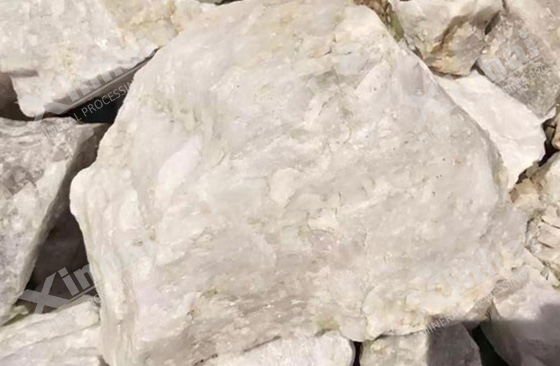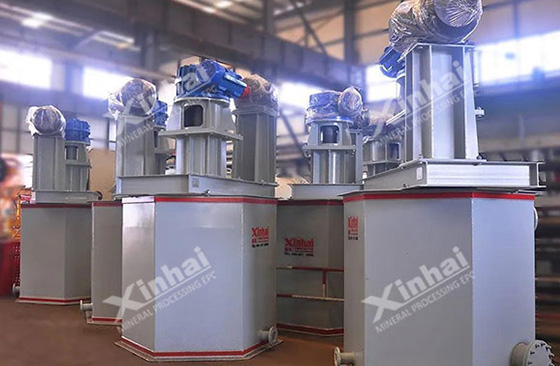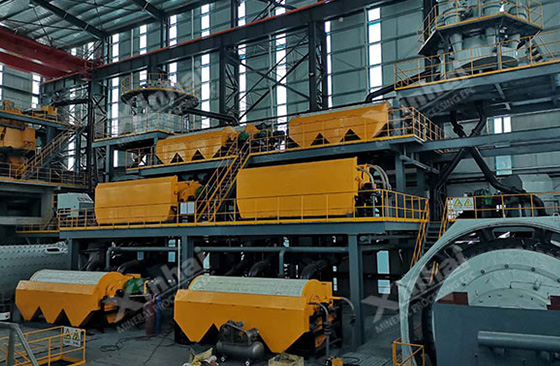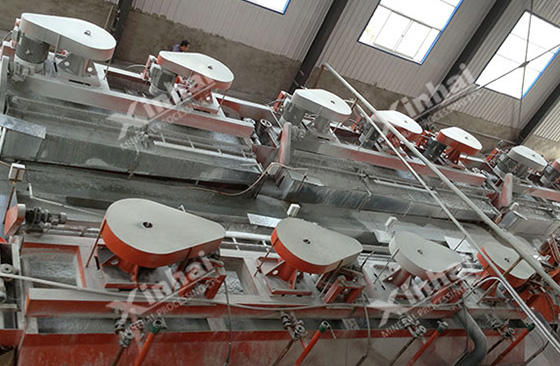Quartz sand is an important raw material for the production of glass, water glass, semiconductor, optical fiber and laser, and is also an essential material in aerospace, atomic energy technology, military industry and other high-tech fields. Quartz sand is applied in different fields with different purity requirements. According to the purity requirements, the quartz sand production process can be divided into a single quartz sand production process and a combined quartz sand production process.

The single quartz sand production process is mainly used for pretreatment or quartz sand when the impurity content is low and the purification requirements are low. The common single quartz sand production process is: washing-grading-sludge, scrubbing, magnetic separation, flotation and acid leaching production process.
1. Washing - classifying - desliming process for quartz sand production
The quartz sand water washing-classification desliming process is mainly to wash and deslim the quartz sand containing a large amount of clay before separation. This is an essential process before mineral processing. In addition, the grade of silica will decrease with the size of quartz grain, and the grade of iron, aluminum and other impurities will increase. Before beneficiation, it is also necessary to remove impurities through washing-classification desliming operation.

2. Scrubbing process for quartz sand production
The scrubbing process is to use the scrubbing machine to remove the thin film iron and sticky impurity minerals attached to the quartz surface through the friction between the ore particles, and then classify the scrubbed ore particles to achieve the purpose of purification, usually used in the pre-selection stage. Commonly used scrubbing techniques include rod scrubbing and mechanical scrubbing.
Rod scrubbing process: In the scrubbing process, an appropriate amount of medicament is added to increase the electric repulsion between the impurity ore and the surface of the quartz particles and improve the separation effect.
Mechanical scrubbing process: the separation of quartz and impurity minerals (clay minerals, iron) is achieved by adding chemicals (water glass).

3. Magnetic separation process for quartz sand production
Quartz sand magnetic separation is a process of separating quartz sand from minerals containing magnetic impurities by using a magnetic separator. Magnetic separation can remove mechanical iron minerals (hematite, limonite, pyrite, ilmenite, biotite, etc.) contained in quartz sand, and can also remove weak magnetic minerals, inclusions and disseminated impurities containing iron minerals.
4. Flotation separation process quartz sand production
The purpose of quartz sand flotation is mainly to remove the non-magnetic impurities (feldspar, mica, etc.), add chemicals to make the minerals adhere to the foam product, and then suppress the feldspar or mica of quartz minerals through specific agents. , to achieve purification. When there are many impurities in the quartz ore, the flotation process can be used when the ideal quartz grade cannot be obtained by scrubbing, desliming and magnetic separation. Common quartz sand flotation production processes are divided into two types: fluorine flotation and fluorine-free flotation.
Fluorine flotation process: Cationic collectors and hydrofluoric acid activators are used to carry out flotation operations in the acidic pH range, but the fluorine-containing wastewater after flotation has a serious impact on the surrounding environment.
Fluorine-free flotation process: remove the hydrofluoric acid activator, use the difference in structure between quartz and feldspar, and the difference in Zeta potential between the two, adjust the anion and cation mixed collector, and preferentially float the long stone to effectively separate the two.

5. Acid leaching process for quartz sand production
Quartz sand acid leaching production process is to use various acid solvents (sulfuric acid, hydrochloric acid, nitric acid and hydrofluoric acid, etc.) to pickle and remove acid-soluble impurity minerals to achieve separation of quartz sand. The quartz sand acid leaching process is divided into two types: single acid leaching and mixed acid leaching.
Single acid leaching process: Add quartz sand to an acid solution of a certain concentration, heat it to a certain temperature (heating for an appropriate time), take back the acid solution, and wash and dry the quartz sand for recovery.
Mixed acid leaching process: add the washed quartz sand minerals into the mixed acid solution, at room temperature, stir and leaching for about 24 hours, then wash and dry; if heated and stirred for about 2~6 hours, then wash and dry.
The combined quartz sand production process is mainly because the process used when a single process cannot meet the purification requirements. The common combined quartz sand production process includes: scrubbing - classifying - deliming, scrubbing - deliming - magnetic separation, rod grinding scrubbing - desliming - magnetic separation - flotation, rod scrubbing - desliming - magnetic separation - flotation - acid leaching and other processes.
1. Quartz sand scrubbing-grading desliming process
The quartz sand scrubbing-classifying desliming process is to use a mechanical scrubber to scrub and deslim the qualified minerals obtained after screening to wipe off the clay impurities on the surface of the ore particles, and then enter the classifier to separate the quartz sand from the clay impurities for mineral separation. Generally, it is mostly used for quartz sand minerals in which a large amount of clay minerals and iron form cement or adhesion on the quartz surface during the weathering sedimentary mineralization process.
2. Scrubbing - desliming - magnetic separation process
This process is to use wet strong magnetic separator above 10,000Oe to magnetically separate it after scrubbing and desliming to remove iron-containing impurities. It is generally suitable for processing weak magnetism such as limonite, hematite, and biotite in quartz. Strong magnetic impurity minerals such as impurities and magnetite.
3. Rod scrubbing - desliming - magnetic - flotation separation process
Rod scrubbing - desliming - magnetic separation - flotation process, using a rod scrubbing machine, adding chemicals to complete the scrubbing, and then performing magnetic separation after grading and desliming, the quartz sand minerals obtained after magnetic separation and impurity removal, and then Flotation is carried out to improve the purity of quartz sand, which is mainly suitable for the treatment of quartz placer containing feldspar.
4. Rod scrubbing - desliming - magnetic - flotation - acid leaching process
This process flow is the process used to obtain higher purity quartz sand after scrubbing, magnetic separation and flotation separation (quartz with a purity of 99.3% to 99.9% can be obtained, which can meet the needs of basic industries). Purified to more than 99.99%, it is mainly suitable for conjoined quartz ore in the form of spots and inclusions.
The above is the introduction of the quartz sand production process. In the actual beneficiation, if you want to obtain the ideal grade of quartz, you need to determine the production process according to the nature of the ore, and you must not copy it. Xinhai recommends selecting mining enterprises with industry qualifications to conduct beneficiation tests, and customize a suitable quartz sand production process according to the test results.